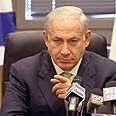
Netanyahu: Settlers are our brothers
Prime minister conveys message of reconciliation to Judea and Samaria residents, saying settlement construction will be resumed in 10 months 'even if Abbas says peace now.' Minister Braverman calls for permanent freeze on certain areas, 'which will be returned to the Palestinians'
Speaking at a Likud ministers' meeting before the weekly cabinet meeting, Netanyahu called on all ministers, Knesset members and settlement heads to act in accordance with the cabinet's decision and abide by the law, clarifying that the decision on a settlement freeze is temporary and does not depend on any diplomatic progress.
"Even if Abu Mazen (Palestinian President Mahmoud Abbas) will come in eight months and say, 'Peace now,' we will begin building as we did before. The cabinet decision is time-limited," the prime minister said.
Environmental Protection Minister Gilad Erdan also tried to calm down the atmosphere in the settlements. "The prime minister has made it unequivocally clear that nine months and 20 days remain until the end of the temporary suspension, and this does not depend on anything other elements will do, including Abu Mazen," he said.
Netanyahu reiterated the remarks at the start of the cabinet meeting. "I would like to clarify that the suspension is for a limited amount of time and not longer," he said. "This is a one-time and temporary decision, not an endless and unconditional one."
The prime minister also addressed Erdan and Interior Minister Eli Yishai's refusal to allot inspectors to enforce the building freeze, as well the acts of protest by MKs and settler leaders.
"We must work together," he said. "Our internal unity is the most important thing. I seek the ministers' cooperation in carrying out the decision and adopting it in the easiest way in order to maintain law and order."
Temporary US pressure?
Netanyahu called on the settlers to practice restraint, saying that the move would help Israel on the international arena."The decision is certainly not easy for the heads of the communities in Judea and Samaria and for us," he said. "These are parts of our homeland, and these are our brothers – they are part of us and we are part of them.
"The decision stems from many of the State of Israel's interests. Today it is also clear who wants peace and who refuses peace. The State of Israel wants peace. The matter has been clarified in the cabinet decision, but it also creates difficulties."
The prime minister clarified that despite the strict enforcement of the decision's implementation, the building which has already begun in the territories will continue without any limits.
"There are difficulties accompanying the decision, some bureaucratic and unnecessary. Therefore, I have appointed a team of ministers, led by Defense Minister Ehud Barak and Minister Benny Begin, together with the coordinator of the government's activities in the territories, Major-General Eitan Dangot, and Cabinet Secretary Zvi Hauser.
"Our aim in appointing this team is not to allow new construction, but also not to stop existing construction. This team has been working since Friday and reports directly to me every day."
But not all government ministers seek to convey calming messages to the settlers. Minister for Minority Affairs Avishay Braverman called for a permanent freeze in certain areas, until Israel withdraws from them.
"The cabinet's decision must be enforced despite the resistance," Braverman said. "The settlers must understand that 75% of them will have to live in the settlement blocs, while the freeze must continue in the remaining area, as it will be returned to the Palestinians eventually."
Minister Yishai said that the American pressure which led to the freeze contradicted earlier agreements between Washington and Jerusalem.
"Everyone sees that this is a real, difficult and painful freeze. Former Prime Minister Ehud Olmert and former American President George Bush also said that the construction in settlement blocs will continue. Therefore, Prime Minister Netanyahu's decision to implement a freeze is extremely painful, but this pressure is only temporary."
During a meeting at the Prime Minister's Office later in the day, Likud Knesset Member Ofir Akonis presented Netanyahu with a long list of suggestions aimed at easing the daily life of settlers in the West Bank, including speeding up the construction of public buildings, particularly educational institutions, and approving building plans for projects that are scheduled to be launched once the construction moratorium ends.
"It is vital that we maintain unity within Likud, stand behind the prime minister's leadership and not repeat past mistakes," said the MK. "Experience has taught us that when the Right topples a prime minister from Likud, the result is the Oslo Accords or the Camp David outline, which mean a return to the 1967 borders and the dismantling of the settlement enterprise."
Netanyahu told Likud MKs during the meeting, "The party is leading the country under difficult circumstances. Some may say that we are going to dismantle the settlement enterprise and therefore Likud should be dissolved as well, but it must me understood that the goal is to achieve the opposite; that is why unity within Likud is so important."
Attila Somfalvi contributed to the report










